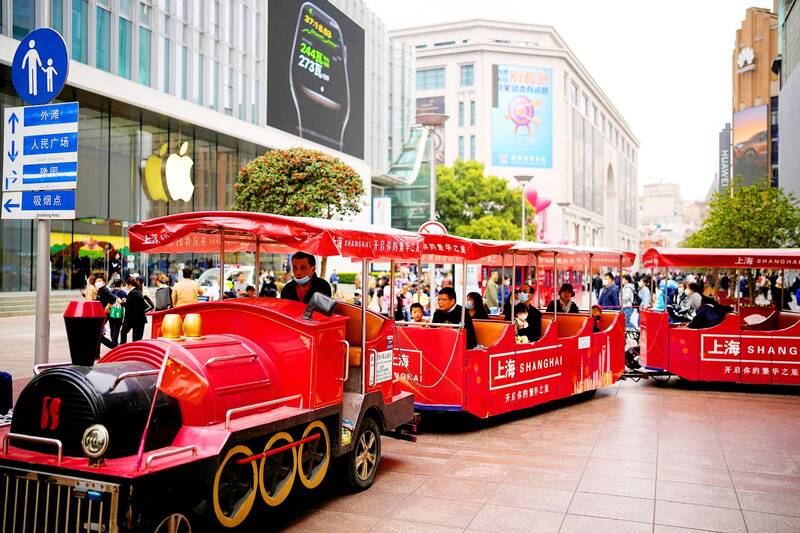Chinese retail sales rebounded in January and last month, as Beijing abandoned its suffocating “zero COVID” policy, reopening borders and ending mandatory quarantine, and the country celebrated the Lunar New Year holiday.
The 3.5 percent growth, released by the Chinese National Bureau of Statistics, came in line with expectations and was much better than the 1.8 percent drop in December last year, indicating that the world’s No. 2 economy was picking up after years of painful restrictions.
Moreover, with Beijing this week announcing it would resume issuing tourist visas, there is hope for further improvement this year.

Photo: Reuters
China usually releases January and February economic data together to ensure they are not skewed by the long Lunar New Year holiday.
Fixed-asset investment also showed an improvement, rising 5.5 percent in January-February — beating forecasts of 4.5 percent growth — as the government poured billions of US dollars into building new railways and industrial parks, bureau data showed.
However, industrial output expanded 2.4 percent — below the 2.6 percent expected.
“Production and demand have improved significantly, and employment and prices are generally stable,” the bureau said in a statement. “The economy is showing signs of stabilization and recovery.”
China has set an economic growth target of about 5 percent for this year, one of the lowest in decades.
However, Chinese Premier Li Qiang (李強) has warned that even this was “not easy” to achieve, as a grinding property crisis continued and global demand slowed.
In a sign of the troubles facing the property sector, investment in real estate fell 5.7 percent in January-February, as the sector continued to feel the effects of a government crackdown to curb risky borrowing by developers, the data showed.
The government has warned that a global slowdown would hamper the country’s recovery from the damage from the COVID-19 pandemic, as exports for January and February fell 6.8 percent compared with a year earlier.
“The economic data released today confirmed the recovery in China was well on track. This is consistent with the strong credit growth released earlier.” Pinpoint Asset Management Ltd (保銀私募基金管理) chief economist Zhang Zhiwei (張智威) said.

CHIP RACE: Three years of overbroad export controls drove foreign competitors to pursue their own AI chips, and ‘cost US taxpayers billions of dollars,’ Nvidia said China has figured out the US strategy for allowing it to buy Nvidia Corp’s H200s and is rejecting the artificial intelligence (AI) chip in favor of domestically developed semiconductors, White House AI adviser David Sacks said, citing news reports. US President Donald Trump on Monday said that he would allow shipments of Nvidia’s H200 chips to China, part of an administration effort backed by Sacks to challenge Chinese tech champions such as Huawei Technologies Co (華為) by bringing US competition to their home market. On Friday, Sacks signaled that he was uncertain about whether that approach would work. “They’re rejecting our chips,” Sacks

Taiwan’s exports soared 56 percent year-on-year to an all-time high of US$64.05 billion last month, propelled by surging global demand for artificial intelligence (AI), high-performance computing and cloud service infrastructure, the Ministry of Finance said yesterday. Department of Statistics Director-General Beatrice Tsai (蔡美娜) called the figure an unexpected upside surprise, citing a wave of technology orders from overseas customers alongside the usual year-end shopping season for technology products. Growth is likely to remain strong this month, she said, projecting a 40 percent to 45 percent expansion on an annual basis. The outperformance could prompt the Directorate-General of Budget, Accounting and

NATIONAL SECURITY: Intel’s testing of ACM tools despite US government control ‘highlights egregious gaps in US technology protection policies,’ a former official said Chipmaker Intel Corp has tested chipmaking tools this year from a toolmaker with deep roots in China and two overseas units that were targeted by US sanctions, according to two sources with direct knowledge of the matter. Intel, which fended off calls for its CEO’s resignation from US President Donald Trump in August over his alleged ties to China, got the tools from ACM Research Inc, a Fremont, California-based producer of chipmaking equipment. Two of ACM’s units, based in Shanghai and South Korea, were among a number of firms barred last year from receiving US technology over claims they have

BARRIERS: Gudeng’s chairman said it was unlikely that the US could replicate Taiwan’s science parks in Arizona, given its strict immigration policies and cultural differences Gudeng Precision Industrial Co (家登), which supplies wafer pods to the world’s major semiconductor firms, yesterday said it is in no rush to set up production in the US due to high costs. The company supplies its customers through a warehouse in Arizona jointly operated by TSS Holdings Ltd (德鑫控股), a joint holding of Gudeng and 17 Taiwanese firms in the semiconductor supply chain, including specialty plastic compounds producer Nytex Composites Co (耐特) and automated material handling system supplier Symtek Automation Asia Co (迅得). While the company has long been exploring the feasibility of setting up production in the US to address